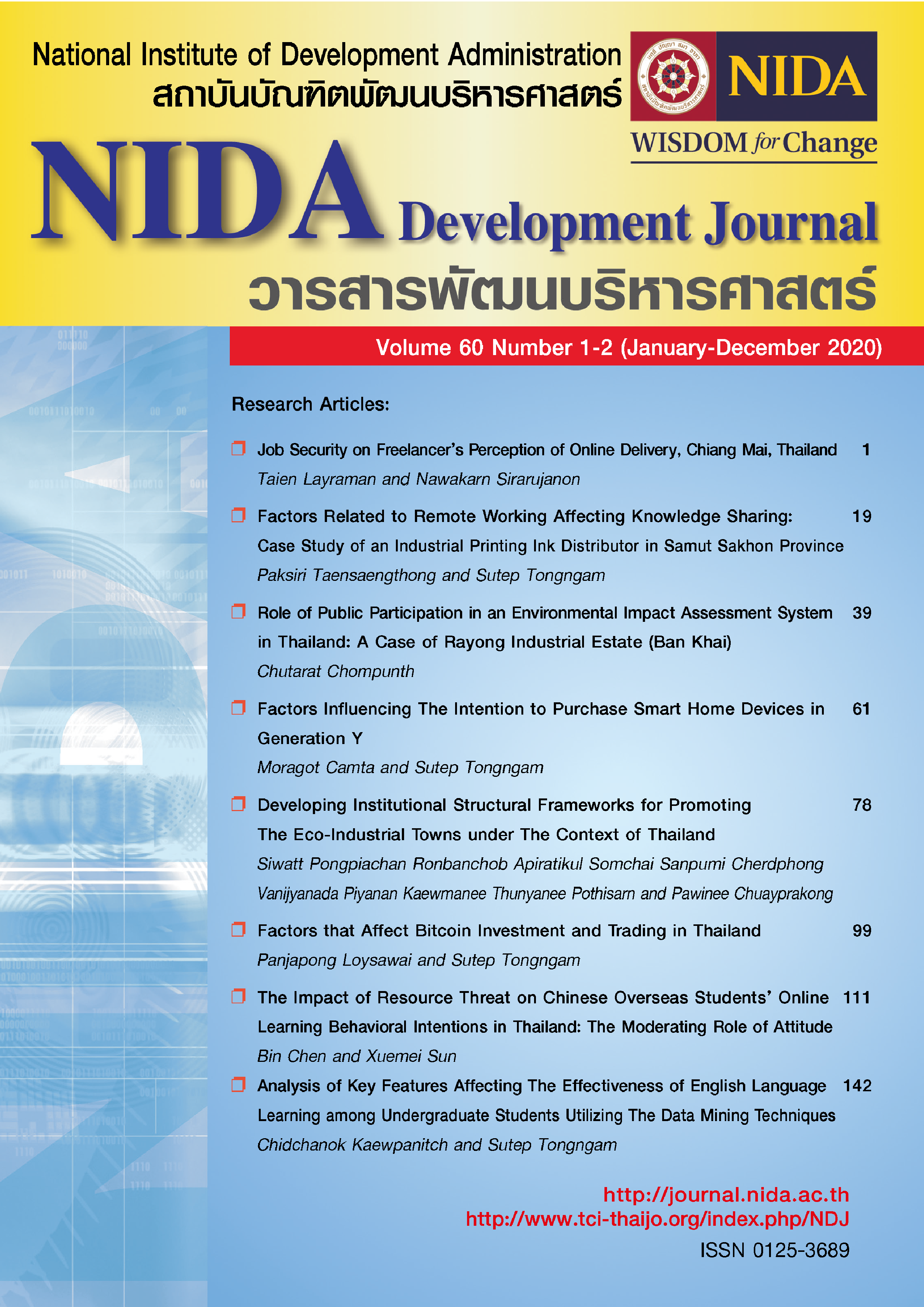Analysis of Key Features Affecting the Effectiveness of English Language Learning Among Undergraduate Students Utilizing the Data Mining Techniques
Keywords:
Data Mining, Decision Tree, Random Forest, Academic Efficiency, Learning EnglishAbstract
The objective of this research was to study and analyze key features affecting the effectiveness of English language learning among undergraduate students. This research utilized data mining techniques and machine learning algorithms to compare the effectiveness and accuracy of the Decision Tree and Random Forest Classifier Supervised Machine Learning algorithms. The Faculty of Geoinformatics at Burapha University Academic year 2018 - 2020 consisted of 299 students. From this department, a survey was used to collect 32 attributes for data mining and analysis. The Content Validation Index used to calculate content validity in the questionnaire, and was greater than 0.7. The Decision Tree and Random Forest Classifier performance were evaluated using a 10-fold cross-validation method with a data ratio of 70:30. Accuracy, Precision, and balance (F1 score) with Confusion Matrix format was used to interpret and analyze the results of the data models.
The results indicated the data model developed with Random Forest Classifier produced a higher classification accuracy for students' English performance than that of the Decision Tree algorithm. The Random Forest Classifier produced an accuracy of 85.14% in classifying students' performance based upon a set of attributes in a given dataset, whereas the Decision Tree produced an accuracy of 78.0% using the same dataset. Random Forest Classifier produced an attribute ranking and correlation coefficient metrics to measure relationship strengths between student grades and other attributes. It found that students that enjoyed learning English had a 0.1194 correlation to the students' English performance. Asking teachers immediately when they didn't understand the content of the lesson had a correlation of 0.1149 to the students' English performance. Interest and attention to English showed a 0.0884 correlation to the students' English performance. Students that studied in groups to review English lessons with friends when the exam was approaching had a correlation of 0.0864 to students' English performance. Students that invested extra time into research and studying English beyond the classroom had a correlation value of 0.0747 to the students' English performance. Each of these measurements was the result of calculating the characteristics that affect English language learning in a University environment. This academic research can help to improve undergraduate students' performance when learning English and can help professors to understand how teaching methods can impact student performance.
References
Alizadeh, M. (2016). The Impact of Motivation on English Language Learning. International Journal of Research in English Education, 11.
Broussard, S. C., & Garrison, M. E. B. (2004). The relationship between classroom motivation and academic achievement in elementary school-aged children. Family and Consumer Sciences Research Journal, 33(2), 106-120.
Chanasap, W. (2017). Applying Data Mining Techniques for Career Guidance of Undergraduate Students, Faculty of Archaeology, Silpakorn University. Proceedings of the 7th National and International Graduate Studies Conference: Thailand 4.0 Innovations for Sustainable Development (NGSC&IGSC).
Chen, I., & Huang, S. (2003). Language learning strategy use differences between high and low proficiency learners – an example from a technology college in Taiwan. Journal of Humanities of Changhua Teachers College, 2, 301-321.
Cortez, P., & Silva, A. (2014). Using data mining to predict secondary school student performance.
Ellis, R. (1997). The study of second language acquisition. Oxford University Press.
Gardner, R. C. (1975). Motivational variables in second language learning. Proceedings of the Canadian Association of Applied Linguistics, 45-73.
Gardner, R. C., & Lambert, W. E. (1972). Attitudes and motivation in second-language learning. Rowley, Massachusetts: Newbury House.
Kabbra, R. R., & Bichkar, R. S. (2011). Performance Prediction of Engineering Students using Decision Trees. International Journal of Computer Applications, 8.
Lucardie, D. (2014). The impact of fun and enjoyment on adults' learning. Procedia - Social and Behavioral Sciences, 142, 439-446.
Maxwell-Jolly, J. (2011). English Learners and Out-of-School Time Programs: The Potential of OST Programs to Foster EL Success. ENGLISH LEARNERS AND OUT-OF-SCHOOL TIME PROGRAMS, 1-12.
Niratsai, S. (2022). Attitudes, Motivation, and English Learning Behavior. Journal of Humanities and Social Sciences, 9(2), 160.
Omer, F. A., Karakurt, E., & Melli, P. (2000). Data Mining For Database Marketing At Garanti Bank. WIT Transactions on Information and Communication Technologies, 25, 93-107.
Oxford, R. L. (1990). Language Learning Strategies: What every teacher should know. New York: Newbury House/ Harper Collins.
Petchrat, P. (2004). Factors Related to Learning Performance of Students at Kasetsart University. Unpublished Master's Thesis, Srinakharinwirot University.
Renninger, A. K., Hidi, S., & Krapp, A. (1992). The Role of Interest in Learning and Development. New York: January 17, 2014 (1st Edition).
Spraat, M., Pulvemess, A., & William, M. (2005). The TMT teaching knowledge test course. Cambridge: Cambridge University Press.
Suebpong, E. (2022). Data Mining. Bangkok.
Suwannapruit, T., & Totarat, S. (2016). Developing Foreign Language Learning Strategies to Enhance Listening and Speaking Skills in Undergraduate Students. Veridian E-Journal, Silpakorn University, 2.
Visser, P. S., Holbrook, A. L., & Krosnick, J. A. (2008). Knowledge and Attitudes. Handbook of Public Opinion Research. Thousand Oaks, CA: Sage Publications.
Wattanawat, P. (1994). Learning Is Not Difficult If You Want to Learn. Bangkok: Charoenphol Printing.
Wu, M. M. F. (2008). Language learning strategy use of Chinese ESL learners of Hong Kong - findings from a qualitative study. Electronic Journal of Foreign Language Teaching, 5(1), 68-83.
Wutthiwongsa, N. (2014). Strategies to Foster Motivation: Developing English Language Skills. Journal of Management, 34(1), 89-97
Downloads
Published
How to Cite
Issue
Section
License
Copyright (c) 2024 NIDA Development Journal

This work is licensed under a Creative Commons Attribution-NonCommercial-NoDerivatives 4.0 International License.





